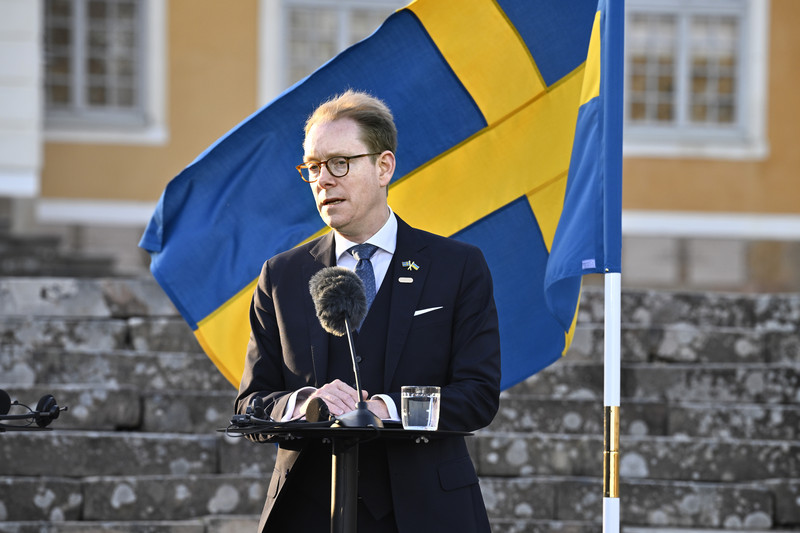Sweden is not going to change its deal with Turkey on Nato ratification, which Finland and Nato still expect in October, despite Turkey’s new rhetoric.
Turkish president Recep Tayyip Erdoğan agreed a seven-point deal with the Swedish prime minister at a Nato summit in Vilnius on 10 July.
-

Hungarian foreign minister Peter Szijjártó with Swedish energy minister Ebba Busch (Photo: consilium)
He also promised to call a ratification vote when the Turkish parliament reconvened in October.
He is now creating fresh uncertainty, by saying the US should first sell him F-16 warplanes and that Sweden stops Kurdish “terrorists” from holding anti-Turkish rallies.
“My parliament doesn’t view this issue positively, they aren’t ready to ratify Sweden’s accession protocol,” Erdoğan reportedly told press in the wings of the UN General Assembly (UNGA) in New York on Monday (18 September).
But for its part, Sweden says the Vilnius deal is not up for debate.
“The agreement is still valid and there will be no new elements added,” Anna Erhardt, the Swedish foreign minister’s spokeswoman, told EUobserver on Tuesday.
And there were no more gatherings foreseen of a special trilateral group (including Finland, Sweden, and Turkey) on ratification before the Turkish MPs meet in October, Erhardt added.
Meanwhile, Hungary is the only other Nato state except Turkey still to ratify Sweden’s entry.
It has promised to go ahead as soon as its friend, Turkey, gives the green light.
Its latest parliamentary agenda, out Tuesday, didn’t table a Sweden ratification vote when the Hungarian parliament reconvenes next week.
And Hungary’s foreign minister, Péter Szijjártó, is also kicking up a new fuss, with a letter to Stockholm last week saying Hungary might not ratify, on grounds that a Swedish public-radio broadcaster published a 10-minute video-clip on Hungary’s democratic backsliding.
EU foreign ministers held informal talks in the UNGA’s corridors on Monday, but the Swedish foreign minister didn’t discuss the issue with Szijjártó there, Erhardt said.
And he is giving equally short shrift to Szijjártó’s letter of complaint, she indicated.
“[Foreign] minister [Tobias] Billström received the letter but will not make any public statements about it,” Erhardt said.
Finland and Sweden launched a joint bid to enter Nato last year, ending decades of neutrality due to Russia’s invasion of Ukraine.
Finland joined on 4 April after overcoming Turkish objections and is now trying to help its Nordic neighbour do the same.
“Finland is confident that Türkiye will proceed with ratifying Sweden’s accession. Sweden meets all conditions for Nato membership,” the Finnish foreign ministry told EUobserver on Monday.
When asked by EUobserver this week what Nato expected of Turkey, its press unit quoted Nato secretary general Jens Stoltenberg’s latest remarks on the subject on 7 September.
“I expect that when the Turkish parliament reconvenes later this autumn the ratification will happen,” Stoltenberg said.
Finland’s Nato entry means it is already training and exercising with allied forces, as well as sharing more military intelligence, its defence ministry said.
“Finland is part of Nato’s advance planning/operational plans to defend the territory of the alliance,” it added.
And the Finnish government will decide, in autumn, which units to contribute to Nato air-policing operations, standing naval groups, and forward-positioned land forces in Europe, the ministry said.
“Finland is fully integrated in the alliance’s political and military structures,” a Nato official said.
‘Russian rhetoric shift’
The Finnish foreign ministry painted a sad picture of Russia relations after more than 18 months of Ukraine warfare.
“Since February last year, contacts in most sectors have been suspended, the vast majority of Finnish companies have left the Russian market, trade has collapsed, and border traffic has decreased drastically,” it said.
But Finland’s Nato accession hasn’t seen any substantial response by Russia, for all its anti-Nato hysteria, the ministry indicated.
“We have recently seen a shift in Russian rhetoric and a narrative of Finland, mainly aimed at the domestic Russian audience. This seems to be Russia’s way of reacting to Finland’s Nato accession,” it said.
“We do not rule out possible further actions from Russia, but Finland is well prepared for different situations,” it said.
By ANDREW RETTMAN
Source: EU Observer



